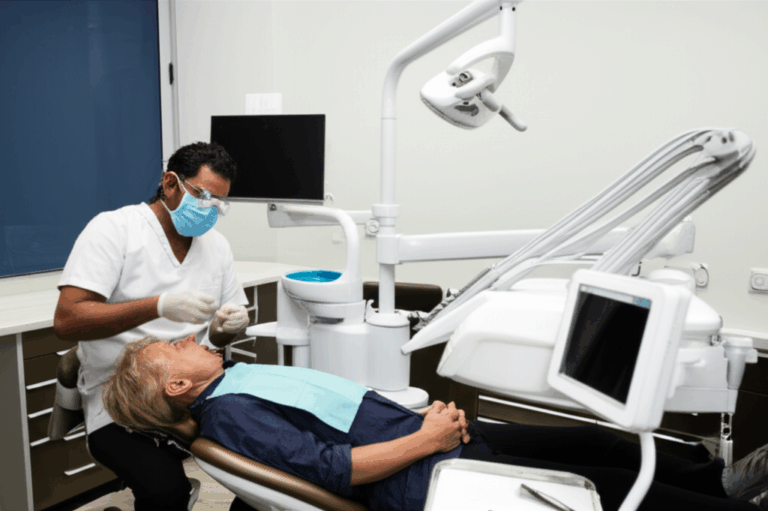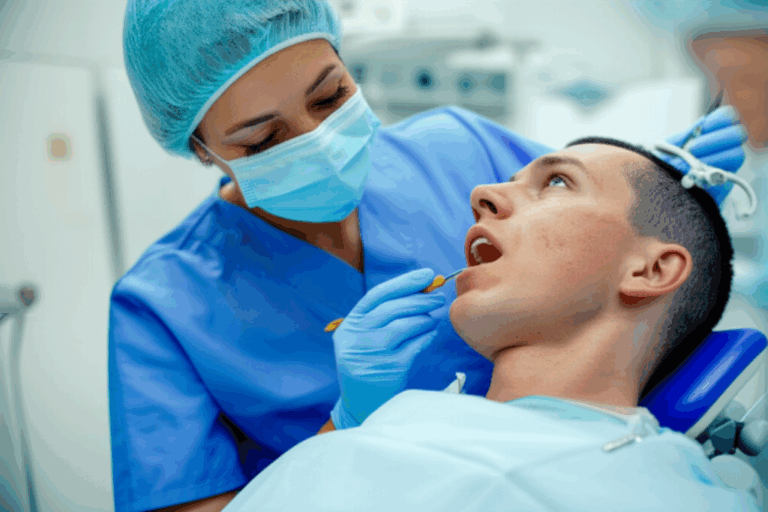
How to Become a Dentist in the UK: Your Trusted Step-by-Step Guide
That dream of wearing a white coat and helping others smile brighter—it’s a strong one, and you’re not alone if you’ve wondered exactly how to become a dentist in the UK. The path is clear, rewarding, but sometimes has a few twists. Whether you’re a student thinking about which GCSEs to pick, a parent supporting a future dentist, or someone wanting a career change, this guide will show you every important step. You’ll get the facts, helpful advice, and the confidence to start your own dental journey.
In This Article
What We’ll Cover:
- Your Journey to a Dental Career in the UK
- Pre-University Requirements: Building the Foundation
- Applying to Dental School: The BDS Degree
- Life as a Dental Student: What to Expect
- Graduating and Becoming Registered: The Next Steps
- Your Career as a Dentist: Opportunities and Pay
- Is Dentistry in the UK Right for You?
- Answers to Common Questions
Your Journey to a Dental Career in the UK
Let’s be honest: dentistry isn’t just about teeth. It’s about trust. It’s about helping worried kids, calming nervous adults, and really making a difference in people’s health and happiness. The UK way to becoming a dentist is well-planned and detailed for a reason—it makes sure you’re ready for all the tough moments. The good news? If you have the drive, kindness, and like learning, you can get there.
But what does it really take? Is it just about being good at science? Do you need perfect grades? Is it open only to A-Level students, or can older people and career-changers do it too? Let’s break it down with simple, honest answers.
Pre-University Requirements: Building the Foundation
What Qualifications Do You Need for Dental School?
It starts here: what you study at school, and how well you do, really counts—especially your GCSEs and A-Levels.
GCSE Requirements for Dentistry
Most UK dental schools want:
- Subjects: English Language, Maths, Biology, and Chemistry. Some are okay with Double Science instead of split sciences.
- Grades: At least a Grade 6 or 7 (that’s about a B or A from the old system).
Why Does This Matter?
Think of your GCSEs like the base for a house—if they aren’t strong, the rest can’t stay steady.
A-Level (or Similar) Entry Needs
- Important Subjects: Chemistry (always needed), and usually Biology.
- Usual Grades: AAA or AAB—this is tough!
- Other Ways In: If you’re taking IB, Scottish Highers, or Irish Leaving Cert, there are similar grade needs, often with top marks in your science classes.
Worried about just missing the grades?
Some universities have widening programs or accept ABB if you do really well on the entrance test.
Why Work Experience Helps
You probably know this, but dentistry isn’t all books. Dental schools want you to have:
- Spent some time in a dental clinic.
- Volunteered in a hospital, care home, or health center.
- Seen patient care and learned to work with a team.
Tip: Write down what you see and what you learn. Think—did something surprise you? Did you see how much talking and listening matter, not just skill with your hands?
Admissions Tests: UCAT and BMAT
Here’s what you need to know:
- UCAT (University Clinical Aptitude Test): Most UK dental schools use this. It checks how you solve problems, notice shapes and space, show kindness, and choose right from wrong.
- BMAT (BioMedical Admissions Test): Only a few dental schools want this. Always check before you apply!
How to Prepare:
- Take practice tests early. A lot of questions are about how you think, not what you remember.
- Most who get offers have UCAT scores above 2500 out of 3600, so aim for the top.
Applying to Dental School: The BDS Degree
If you have the background, now it’s time to start building on it!
Picking the Right Dental School
There are great dental schools all over the UK—each a bit different. Think about:
- Where it is: Do you want a city, or a campus in the countryside?
- How you’ll learn: More lectures or lots of hands-on practice?
- What they have: Proper labs, research, real patients.
- Reputation and ranking.
Good Schools to Look At: King’s College London, University of Manchester, University of Glasgow, and others.
The UCAS Application
You apply to dental school through UCAS. Here’s what matters:
- You can choose dentistry for four of your five choices—try to have a backup for your last pick!
- The application deadline is usually October, earlier than for most courses.
- References are important. Ask someone who knows your science skills or how you treat people.
Writing a Great Personal Statement
What do universities want from you? They want to see you’re real, you care, and you think about what you learn. Don’t list things—show what you learned. Maybe you watched a dentist calm someone down. Say what stood out, what was hard, and how it made you think about dentistry.
Dental School Interviews: What to Expect?
If you make it this far, you’ll get an interview—often a Multiple Mini Interview (MMI). They may test:
- Why you want to be a dentist.
- How you deal with what’s right and wrong.
- How you explain trickier ideas in simple words.
- If you have good hand skills: Could be threading a needle or putting together a block puzzle.
How to Prepare: Practice talking about your experiences and what matters to you, not just science facts.
Life as a Dental Student: What to Expect
Course Structure and Length
The BDS (Bachelor of Dental Surgery) is the degree that takes you from student to soon-to-be dentist.
- How Long: 5 years (normal) or 4 years (if you already have a related degree).
- Main Subjects: Anatomy, body functions, medicines, mouth diseases, dental materials.
- Real Practice: You start seeing patients early on—sometimes in your first year—and do more as you learn.
Picture this: It’s like learning to ride a bike. At first it’s tricky, but you get the hang of it the more you try.
Skills You’ll Learn
- Dental skills: Check-ups, fillings, pulling teeth.
- Conversations: Explaining things in a simple way.
- Thinking: Figuring out what’s wrong even if you get little info.
- Steady hands: Makes a big difference!
- Professional skills: Being caring, keeping things private, and acting right—these are must-haves.
Paying for Your Degree: How Much Does It Cost?
- Tuition Fees: £9,250 a year for UK students; for overseas students, it’s more—sometimes £20,000 to £45,000 a year.
- Living Money: Save or plan for £9,000 to £15,000 each year, depending on the city.
- Student Loans: Most UK students can get help. Non-UK students need their own funds or a scholarship.
- NHS Bursary: In England, it’s for your last (fifth) year or if you’re in a fast-track course—check if you can get it.
Graduating and Becoming Registered: The Next Steps
Once you pass your last exams (yes, you can!), you have two important things left before you can be called a real dentist.
Dental Foundation Training (DFT) / Vocational Training (VT)
Think of this as your practice year—a safe space before you work alone.
- How Long: One year.
- What You Do: See real patients, but with help from an experienced dentist. You get paid—usually £30,000 to £40,000 a year.
- Why: To build your confidence, use everything you’ve learned, and get better judgment.
You get your spot through a national recruitment system. You apply, rank your favorite clinics, then do an interview.
Signing Up with the General Dental Council (GDC)
To work legally as a dentist in the UK, you must be registered with the GDC. After your BDS and your DFT:
- Send your papers.
- Pay the registration fee.
- Make a promise to work professionally.
This shows your patients they can trust you.
Never Stop Learning: Continuing Professional Development (CPD)
Dentistry changes fast—new tools, digital machines, better ways to treat. The GDC says you must:
- Take a set number of CPD hours each year.
- Keep learning—things like x-rays and making sure patients are safe.
- Write down what you learn.
This keeps you at your best your whole career.
Your Career as a Dentist: Opportunities and Pay
So, you’ve finished training, got registered, and can start your real job. What can you do with your skills?
First Jobs: Where You Can Start
- NHS or Private Practice Dentist: Most fresh dentists start in NHS clinics, but private practice has different pros and cons.
- Community Dental Work: Helping kids, adults who need extra support, or people who can’t get to a regular dentist.
- Hospital Dentistry: More specialised, sometimes needs extra learning.
Learning More and Specialising
Dentistry isn’t just about fillings and cleaning. After more experience and extra training, you can become:
- Orthodontist: Braces and straight teeth.
- Oral Surgeon: More advanced surgery, like taking out wisdom teeth.
- Endodontist: Root canal expert.
- Periodontist: Gum specialist.
- Children’s Dentist (Paediatric): Focused on the young ones.
These jobs need extra years of training and sometimes tough selection.
Money and Future Work
Money isn’t everything, but it’s important when planning for university and life.
- new Dentist Salary (DFT): £30,000 – £40,000 for your first year.
- Working as an Associate: Most dentists earn between £50,000 and £100,000+ based on how much they work, patient numbers, and whether it’s private or NHS.
- Private Dentists: You can set your own prices, but it may cost more to run your own place.
- Specialists and Consultants: Can earn over £100,000, especially with experience and if you work for yourself.
And if you don’t want to do clinical work forever? Many dentists move into teaching, research, community medicine, or management jobs.
Is Dentistry in the UK Right for You?
It’s a large decision, and it’s normal to feel unsure. Here’s a clear look at both sides and who is likely to do well in this job.
The Good Points
- Feels good: You help people every day.
- Secure work: Dentists are needed all over the UK.
- Good pay: It builds up as you get experience.
- Flexible: Part-time or full-time, NHS or private, city or country.
The Hard Bits
- It’s tough to get in: Not everyone with top grades gets in the first time.
- Hard work: Loads of study and you need to manage your time well.
- Emotionally hard: Some days are stressful or there are tough cases.
Who Does Well?
- You love science— but also really like people.
- You have steady hands and a steady mind.
- You’re happy to keep learning, even after university.
Practical Tips and Resources
- Stay organized: Have a checklist for everything you need and when it’s due.
- Ask for help: Talk to current dental students or see if you can shadow a dentist.
- Practise hand skills: Even things like arts and crafts are good for practice!
- Read up: Not just science, but books about how to talk to people or what’s right and wrong.
Want to see how crowns and bridges are made? Check out a crown and bridge lab for a look at how dental fixes are built.
FAQs: Your Most Common Questions, Answered
How long does it take to become a dentist in the UK?
- Minimum: 5 years (BDS) + 1 year (DFT/VT) = 6 years before you can work by yourself.
Is dentistry hard to get into?
- Yes. Only about 1 in 6 people get an offer. You need top grades, strong UCAT/BMAT scores, proper work experience, and a thoughtful personal statement.
Are there other ways in for older students or university grads?
- Yes! Graduate-entry BDS courses (normally 4 years) are there for students with earlier science degrees. You still need to compete, but it’s a great way in.
Can non-UK students study and become a dentist here?
- Yes—but it’s harder. You’ll need better grades, strong English, and funding for studies and living.
What’s the difference between a dental hygienist, therapist, and dentist?
- Dental hygienist/therapist: Focuses on prevention, cleaning, and basic care—needs less training.
- Dentist: Does everything—diagnosing, tricky fixes, pulling teeth, and has full responsibility.
Your Healthy Takeaway: The Action Plan
Let’s finish with steps you can follow:
Checklist for Future Dentists
- Get high grades in GCSEs and A-Levels (Chemistry and Biology matter most).
- Get, and think about, work experience.
- Get ready for and do well on the UCAT/BMAT.
- Search and apply to the top dental schools through UCAS.
- Write a personal statement and do well at interview.
- Plan money—tuition and what you’ll live on.
- Be ready for lifelong learning and high standards.
Remember: Nobody expects you to know everything at the start. Stay curious, stay driven, and ask for help—teachers, students, and official guides. If you want to be a dentist, you can find a way.
Want to Learn More?
Want to know what dental students go through, hear real stories, and get tips for interviews or your first year? Check out our dental practical guide. And if you want to see how dental crowns and other pieces are crafted, have a look at a dental ceramics lab to find out more about the creative side.
Still wondering if it’s right for you? Talk to a teacher or job adviser. Sometimes, a simple chat makes your next step clear.
Medically reviewed and checked by qualified dental professionals. This guide is based on trusted sources, including the General Dental Council, NHS Health Careers, and university admissions data.
You can do this. The future of UK dentistry needs curious, caring, and hardworking people—just like you.
Final Words:
If you’re ready, start now. Build your base. Get experience. Aim high. And remember: a brighter smile begins with you.








